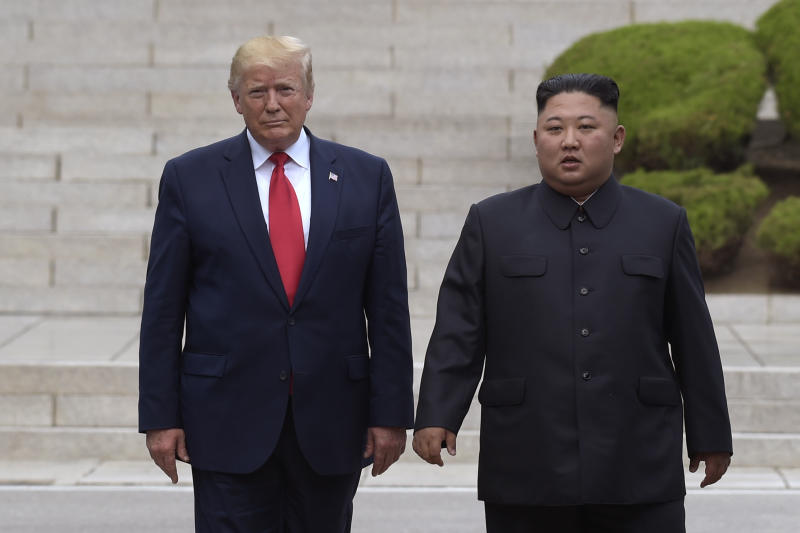New missile test looms as Trump fails to sway Kim Jong Un
Sign up now: Get ST's newsletters delivered to your inbox

In a photo taken on June 30, 2019, President Donald Trump meets leader Kim Jong Un at the North Korean side of the border at the village of Panmunjom in the Demilitarised Zone.
PHOTO: AP
Follow topic:
WASHINGTON (NYTIMES) - US military and intelligence officials tracking North Korea's actions by the hour said they are bracing for an imminent test of an intercontinental ballistic missile capable of reaching United States shores, but appear resigned to the fact that President Donald Trump has no good options to stop it.
If the North goes ahead with the test in the coming days - Pyongyang promised a "Christmas gift" if no progress had been made on lifting sanctions - it would be a glaring setback for Mr Trump's boldest foreign policy initiative, even as he faces an impeachment trial at home.
US officials are playing down the missile threat, though similar tests two years ago prompted Mr Trump to suggest that "fire and fury", and perhaps a war, could result.
Mr Trump often cites the suspension of long-range missile and underground nuclear tests for the past two years as evidence that his leader-to-leader diplomacy with the North was working - and that such negotiating skills would persuade the North's leader, Mr Kim Jong Un, to give up his arsenal.
The administration's argument has now changed. Should Mr Kim resume tests, US officials said, it will be a sign that he truly feels jammed and has concluded Washington will not lift crushing sanctions on his impoverished nation anytime soon.
Left unaddressed, however, is the challenge that a new missile test would represent and what that would mean for the sanctions strategy.
Over the past week, Mr Stephen Biegun, the North Korea envoy who was confirmed by the Senate last Thursday as the next deputy secretary of state, travelled across East Asia to also try to stem new efforts by Russia and China to weaken those sanctions.
Military officials said there are no plans to try to destroy a missile on the launchpad or intercept it in the atmosphere - steps both presidents George W. Bush and Barack Obama considered and rejected. It is unclear if the military's Cyber Command is still trying to sabotage the launches from afar, as it did under the Obama administration, with mixed results.
Instead, officials said, if the North resumes its missile tests, the Trump administration will turn to allies and again lobby the United Nations Security Council for tightened sanctions - a strategy that has been tried for two decades.
Mr Siegfried Hecker, the former head of the Los Alamos National Laboratory and one of the few Westerners who has seen the North's uranium production facilities, said he believes the country has fuel for about 38 warheads - double an earlier estimate that he and other scientists and intelligence analysts had issued.
In recent weeks, the North has conducted ground tests of what appear to be new missile engines that Pyongyang said would bolster its "nuclear deterrent", suggesting that it has little intention of giving up its ability.
"I think part of this may be bluff on their part," Mr John Bolton, the former national security adviser, said to NPR last Thursday. "They think the President's desperate for a deal, and if they put an artificial time constraint on it, they may think they're going to get a better deal. We'll just have to wait and see. But," he noted, "this is all part of the North Korean playbook."
A new element of the playbook could be that Mr Kim is calculating that impeachment has weakened Mr Trump, making him more desperate for a policy victory.
With no diplomatic progress between Washington and Pyongyang since the implosion of the last summit in February between Mr Trump and Mr Kim in Hanoi, Vietnam, administration officials are loath to see Trump leap into another face-to-face negotiation.
While Mr Trump's initial diplomatic outreach to Mr Kim raised hopes and generated positive headlines, the President also accepted vague language calling for the "denuclearise of the Korean peninsula" as an ironclad commitment by the North to rid itself of its own weapons.
The expected North Korean escalation will leave Mr Trump with an unpalatable choice. He could reprise his alarming threats of military action from late 2017, infusing the 2020 election year with a sense of crisis, which could cost him votes - and risk real conflict.
Or he could endure the new provocation and double down, betting that greater sanctions could somehow force the North to abandon its decades-long course toward a nuclear-tipped missile capable of striking the continental US.
KIM PLAYS HIS HAND
The recent threats from Mr Kim come as he is preparing for two important political events: a year-end plenary session of the Workers' Party of Korea and a New Year's speech. Mr Kim had declared at the start of 2019 that North Korea would not give up a single weapon until the US lifts sanctions. He then gave Mr Trump a year-end deadline.
Now, Mr Kim finds himself empty-handed, unable to stride into the party plenum in triumph or deliver a pronouncement of victory on Jan 1. Backed into a corner, he is trying once again to use his main leverage - the threat of weapons tests or military action - to coerce Mr Trump into sanctions relief, analysts said.
"Things have not worked out the way he has anticipated," said Ms Jean Lee, a Korea expert at the Wilson Centre. "I suspect that he will keep provoking President Trump to compel him to get back to negotiations, but try to avoid overtly confronting him because he wants to leave open an opportunity."

